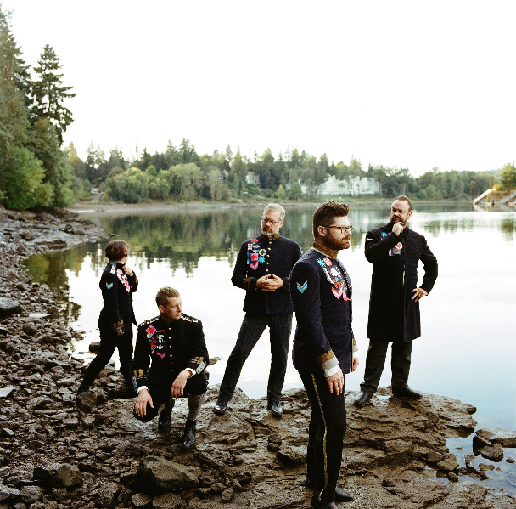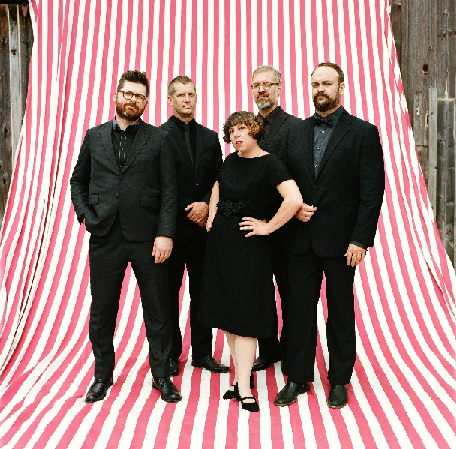If there is one thing that The Decemberists are bad at (and there might only be one thing), it’s keeping a low profile. For most of the time since releasing their last studio album – the US Billboard charts’ number one The King Is Dead – almost four years ago, the band have, in theory, been on hiatus. Although they have popped up – just occasionally – to appear in The Simpsons, Parks and Recreation and on the Hunger Games soundtrack; release a live album; release an EP; and pursue various solo and side-projects. Oh, and front man Colin Meloy has released another book.
Well they’re back (like, officially, this time) and their album What a Terrible World, What a Beautiful World is, in one word, glorious. Although varied in musical range and subject matter, the overall feel is of a big, joyous pop record.
Was this the plan all along? “No,” says Colin firmly, “when we initially went in [to the studio] it was for three days. The whole point was not to have any idea, not to have any pre-conceived notion. We came at it without any concept. The concept was that there was no concept, to let the songs decide the tone. I thought that some of these songs needed that kind of up-tempo gloss.”
The album does still, however, retain the folk influence that is at the heart of The Decemberists’ aesthetic, both visually and aurally. Folk music “has just been a part of what we are and what we do since we started,” says Colin. He has been influenced strongly by the singers of the British folk revival, such as Shirley Collins and Lal Waterson.
Why has British folk been so important for the band?
“I think that the American folk revival tended to be topical. It was really a progressive movement with people like Bob Dylan at the fore. There wasn’t as much of a tradition: original [collected] material was not quite so essential. Whereas there wasn’t really a Dylan in Britain. The British folk revival was a truer folk revival – it was about taking an old art form and giving it new life. That’s something I find more interesting, being curators for a lost voice, the voice of song-writers, song-creators.”
Despite his interest in the 70s revival, Colin admits that he doesn’t listen to many modern British artists working in the tradition. Of those he knows he picks out “Alasdair Roberts, who’s supported us before. And Serafina Steer who’s opening for us this time – I think of her as very much in that tradition.”
“What about someone like Mumford and Sons,” he asks, “would they be classed as British folk?”
For Folk’s Sake suggests that Mumford and Sons are more of a pop band defined by American influences like bluegrass. “You see, that’s interesting,” says Colin, “because to me they don’t sound remotely American. They sound very British to me and I think that for a lot of Americans they would. I think that says a lot about the weird relationship between Britain and America. I find that interesting, the idea of doing something that’s native to a country that isn’t yours, – trying to do it but doing it all wrong. You see it with British R n B people trying to do American music but not doing it right. And they come out with something that sounds completely its own.”
“I always wonder how people see us in the UK, whether we’ll be welcomed or seen as usurpers. We’re a very American band but the British folk revival has found its way into our music. I don’t really know how that’s seen or where folk really sits within the wider culture, whether it’s seen as fusty or cool.”
It is perhaps surprising that Colin still worries about the band’s reception after the phenomenal success of their last two albums. When For Folk’s Sake suggests in passing that The Decemberists are now household names, Colin hesitates. “It depends on the household” he laughs. But he agrees that things have seemed substantially ‘bigger’ for the past few years.
Was there a moment that he realised how big the band are now? “No, I think we’ve only ever done things in small increments. I don’t know if we’ll ever feel the shock of celebrity – or near-celebrity. It’s happened slowly.” He pauses and adds: “being Simpsonised is quite surreal.”
Colin says that the band’s wider reception was not something that was on his mind when making the new record. “With The King is Dead it was on my mind a lot more. I wasn’t trying to make it accessible but I wanted to write pretty songs. [2009’s] Hazards of Love was partly about making songs that were ugly or scary or weird”
Lastly, For Folk’s Sake asks Colin if he can recommend a book. He says he’s reading “a handful” at the moment, among them Being Mortal by surgeon Atul Gawande, “a look into end of life stuff”, and a novel set in World War II. He’s also listening to Bleak House as an audiobook – he says it’s “fantastic” hearing all the voices coming from the same narrator.
Who knows, maybe there’s a concept for a new record hidden somewhere in that reading list. For now, though, we have What a Terrible World, What a Beautiful World, a record brimming with all sorts of voices, old and new.
‘What A Terrible World, What A Beautiful World‘ is out now on Rough Trade
words: Tom Moyser


